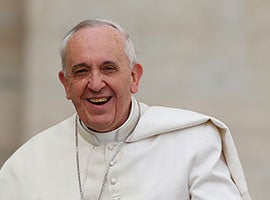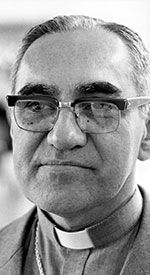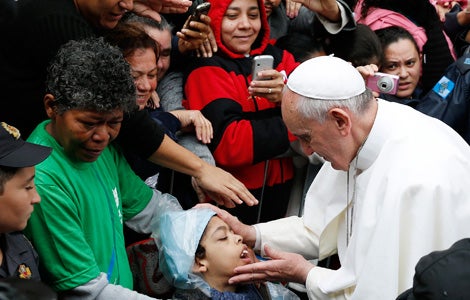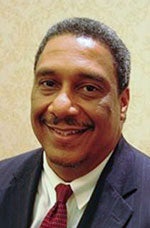Jesus Wept
A Reflection on the Gospel from the Fifth Sunday of Lent
Ralph McCloud is the Director of the Catholic Campaign for Human Development."He cried out in a loud voice, "Lazarus,come out!" The dead man came out, tied hand and foot with burial bands, and his face was wrapped in a cloth. So Jesus said to them, "Untie him and let him go."
My earliest memory as a young child was of family
meals. Everyone gathered around the table was required to say a Bible verse
before we prayed, in unison, grace before meals. The younger children always
took the easy way out and say "Jesus wept" when our turn came. It almost became
an exercise in inappropriate humor as one by one we rushed through the two word
verse to begin chowing down.
My faith-filled grandmother grew tired of what seemed
to be an innocent but irreverent undertaking. She interrupted us with a
matronly fury and asked if any of us 4-7 year old kids knew what we were saying
when we blurted out "Jesus wept". Of course, none of us did.
She then gave us the Webster definition of the word
"wept". Then, she gave us her definition
of who Jesus was, and what he meant to her: a compassionate, loving, caring and
feeling friend. Until that point, I had never thought of Jesus as being human; and
to hear that he felt grief and actually cried.
The Gospel tells us that Jesus wept at hearing of the
loss of his friend. There are many other examples of Jesus' emotions in the Gospels.
He felt sorrow, grief, anger and fatigue.
He weeps as he lovingly gazes upon his children denied life...
As an adult, thinking of Jesus weeping is heartbreaking
because he means so much to all of us. I can't help but wonder what would make
our brother Jesus weep today. Last week I feel like he wept with United States
and Mexican bishops on the US-Mexico border in the face of an inhumane fence
and cold hearted legislation that divides his family. He weeps as he lovingly
gazes upon his children denied life, education, employment, just wages and
housing.
Reflecting on the Gospel account of the raising of Lazarus,
I visualize Jesus with his tears dried on his face yet smiling after being
assured of the power of God as Lazarus was about to be raised to life. He
probably grinned as he asked those gathered to roll the stone away and witness
the glory of God as Lazarus walked out. He probably felt reassurance as he reflected
upon the faith of those gathered and of his friend who he would see alive
again.
Lent is that season where we as Christians experience
our own self-imposed discomfort in hopes of becoming closer to Jesus, who
became closer to us.
Pope Francis invites us to walk with those who
struggle; to feel the pain and allow our human emotions to cause us to act. In
the "Joy of the Gospel", he says:
"Sometimes
we are tempted to be that kind of Christian who keeps the Lord's wounds at
arm's length. Yet Jesus wants us to touch human misery, to touch the suffering
flesh of others. He hopes that we will stop looking for those personal or
communal niches which shelter us from the maelstrom of human misfortune and
instead enter into the reality of other people's lives and know the power of
tenderness. Whenever we do so, our lives become wonderfully complicated and we
experience intensely what it is to be a people, to be part of a people."
Connecting people together is one of the goals of
the Catholic Campaign for Human Development. The Campaign lives out the Gospel
by drawing upon the faith of thousands of Catholics to "be a people", as
described by Pope Francis.
For more on how to get involved in the work of the Catholic Campaign for Human Development, visit www.povertyusa.org and www.pobrezausa.org. Also follow us on Twitter and Facebook!
Removing the Mud from Our Eyes
A Reflection on the Readings from the Fourth Sunday of Lent
Ralph McCloud is the Director of the Catholic Campaign for Human Development.“As Jesus passed by he saw a man blind from birth.
His disciples asked him,
“Rabbi, who sinned, this man or his parents,
that he was born blind?”
Jesus answered,
“Neither he nor his parents sinned;
it is so that the works of God might be made visible through him.” (Jn. 9)
It’s easy and convenient to attach blame or assign cause when we observe our brothers and sisters in distress or struggling:
They’re just lazy…And the one we hear far too often (quoting Jesus out of context): Well, the poor will always be with us!
They come from a worthless part of town, so they will be worthless…
Immigrants are ruining our country!
Young people of color are innately violent gang members…
If they would have just taken a different road...
They choose to be poor…
They’re just milking the system…
Genetically speaking, that race has no capacity to learn…
Jesus invites us not to blame or over-analyze, but to look for ways to invite the works of God to be made manifest through the distress and affliction.
Miracles, like the ones in the Gospel, happen when people like you and me with God’s help intervene to sooth the distress of others. Soothing the pain of others without squandering valuable time wondering why they are hungry, homeless, unemployed or blind. Look beyond distraction to find a shared humanity. Embrace the recollection that we, too, have been beneficiaries of miracles where friends, families and strangers stepped in to relieve our suffering, emboldened by God’s grace. How many times has Jesus removed the theoretical mud from our own eyes so that we could see the stranger, the weak, the powerless?
How many times has Jesus removed the theoretical mud from our own eyes...
This Lenten season, as we take up our cross to follow Jesus, may we be reminded that our cross does not prohibit us from seeing the cross of others. In fact, to carry our cross worthily, we must have a legitimate and real concern for others that propels us to act on their behalf. This can be tough, and like the blind man, faith is often all we can rely on. But when faith is engaged, as witnessed by the blind man, wonderful things can happen.
 Pope Francis described faith this way:
Pope Francis described faith this way:
"Faith is not a light which scatters all our darkness, but a lamp which guides our steps in the night and suffices for the journey. To those who suffer, God does not provide arguments which explain everything; rather, his response is that of an accompanying presence, a history of goodness which touches every story of suffering and opens up a ray of light." (Lumen Fidei)
Putting faith into action is what the Catholic Campaign for Human Development does. For over 45 years, the Campaign has counted on the faith of thousands of Catholics to help soothe a wounded society. Because of that faith, CCHD can provide needed funding for a group of parishes and congregations to come together and make their communities safe and healthy.
Remember: “Live as children of light, for light produces every kind of goodness and righteousness and truth.” (Ep. 5)
For more on how to get involved in the work of the Catholic Campaign for Human Development, visit www.povertyusa.org and www.pobrezausa.org. Also follow us on Twitter and Facebook!
Jesus our Hope
A Reflection on the Readings from the Third Sunday of Lent
Ralph McCloud is the Director of the Catholic Campaign for Human Development.”And hope does not disappoint, because the love of God has been poured out into our hearts through the Holy Spirit who has been given to us.”
Geraldo paints the final stroke on the new windows he’s just installed on his home. He steps back, gazes with pride and recalls the journey to get his long hoped-for home.Geraldo came to the United States with his family and many skills. But he didn’t know how to navigate the complex United States labor system. He stood outside a local hardware store for 8 months waiting, hoping and praying for that day when he might get steady work to support his family. A job he always hoped for.
He remembered carrying a meager lunch under his arm each morning, kissing his family good-bye; hoping this might be the day. More often than not unscrupulous “employers” would pick him up, work him 10-14 hours and give him have ½ the agreed upon pay, if he was lucky.
Geraldo knew he had no recourse—he was undocumented. Because he needed to support his family, he couldn’t really report these crimes to anyone. Eight months later, after standing in extreme hot and cold temperatures of summer and winter, he was invited to a meeting. A meeting where others shared his plight. They spoke of creating a common place to meet, with shelter from the elements. A place where they could negotiate fair wages with dignity. Eventually, Geraldo got a full-time job, one that even paid overtime! Geraldo could now provide for his family and also save a bit to purchase and rehab a house. A house he had only hoped for.
Pope Francis makes the connection between poverty and hope.
His three children are stellar students in the neighborhood school, and now he volunteers as a handy man in his parish. His kids now get an education he had only hoped for. Against overwhelming odds, he never gave up hope. Geraldo’s hope was like that Moses had in this weekend’s readings. Feeling pressure from those he loves, and against insurmountable odds, Geraldo, like Moses before him, can only cry out for God’s tender mercy.
Poverty cripples many like Geraldo and leaves them in a pit of despair. In Geraldo’s case there was no home, no money, no resources, no prospect of consistent work, no HOPE.
Pope Francis makes the connection between poverty and hope. He says that “poverty calls us to sow hope . . . Poverty is the flesh of the poor Jesus, in that child who is hungry, in the one who is sick, in those unjust social structures.”
In desperate situations, we have to sow hope for our brothers and sisters. Archbishop Oscar Romero, a
modern day martyr whose death we recall this week, sowed just this type of
hope. He was killed celebrating Mass on March 24, 1980. He hoped for an El Salvador where people could live in freedom from
oppression and in freedom to hope. 
Taking up our cross to follow Jesus this Lenten season, we are reminded of the hope that Jesus has for us. And for the Geraldos of the world, those who need our help, and for all those “little ones” on the margins for whom hope is almost gone.
The Catholic Campaign for Human Development provides hope. CCHD addresses poverty in places where it seems all hope is lost. In the example of Geraldo, CCHD empowered immigrants to organize and stand up for their rights, and in doing so restored hope. It helped create a community that Geraldo and his family always hoped for.
As we wrestle with today’s difficult economic times, it’s helpful to think back to a time and place where all hope had almost vanished, the El Salvador of Romero’s day. We recall his courageous and HOPEFUL words:
“We know that every effort to improve society, above all when society is so full of injustice and sin, is an effort that God blesses; that God wants; that God demands of us.”
These last words were taken from Oscar Romero’s last sermon, moments before he was shot and killed.
On the Journey with Jesus, Our Compassionate Brother
A Reflection on the Gospel from the Second Sunday of Lent
(MT 17:1-0)
"When the disciples heard this, they fell prostrate and were very much afraid. But Jesus came and touched them, saying, 'Rise, and do not be afraid.'"
As we walk with Jesus on our Lenten journey, we become aware that we walk with a loving, gentle and compassionate brother.
We stroll with a Redeemer who has our well-being foremost in his heart. As we pace through daily life, we encounter those along the journey who are hungry, tired, bruised, battered and weary. Walking with Jesus, we come to recognize them and our shared humanity. A shared humanity that we also have in common with Jesus.
These encounters can cause us discomfort, anxiety, uncomfortable awkwardness and fear. Jesus invites us to a deeper relationship, not just with him but with all those we encounter along life's thoroughfares. And in our anxiety and fear, he lovingly says to us, "Do not be afraid". This grace allows us to accompany.
Fear seems to be our natural and initial reaction to those who
struggle. In that fear and trepidation, we can find the courage
of God's grace shine forth intensely. In that grace we find comfort, we
find strength. We find a peace that propels us to act to soothe the needs of
those we encounter. We enjoy a grace that inspires us to feed the hungry, to
comfort the weary, to sooth the bruised and do more than just listen. This
grace allows us to accompany.
Pope Francis tells us: "We need a Church capable of walking at people's side, of doing more than simply listening to them; a Church which accompanies them on their journey."
As Jesus does for us, we must accompany those who journey from brokenness to wholeness, a sharing in their brokenness that delivers a fullness of life for both of us.
 The Catholic Campaign for Human Development walks with
people throughout the country on the road to healing and wholeness. CCHD
connects people to people to overcome hunger, division and injustice.
The Catholic Campaign for Human Development walks with
people throughout the country on the road to healing and wholeness. CCHD
connects people to people to overcome hunger, division and injustice.
You can get involved. Commit to learn, pray, act, to seek
out and walk with your neighbor this Lent.
For more on how to get involved in the work of the Catholic Campaign for Human Development, visit www.povertyusa.org and www.pobrezausa.org. Also follow us on Twitter and Facebook!
Get away, Satan!
A Reflection on the Gospel from the First Sunday of Lent
(MT 4:1-11)
Ralph McCloud is the Director of the Catholic Campaign for Human Development.At the beginning of Lent, we can think about the temptations faced by Jesus in the desert.
Jesus was a man on a mission. A mission for others.
"Command that these stones become loaves of bread!"
Satan threw down a challenge to Jesus. He wanted Jesus to withdraw from others, to think only about himself and his hunger, and to give in to distraction.
"The devil took him to the holy city, and made him stand on the parapet of the temple, and said to him, … 'throw yourself down!'"
Satan threw down another challenge. He wanted Jesus to turn away from it all, to despair, to give up and to throw in the towel.
"Then the devil took him up to a very high mountain, and showed him all the kingdoms of the world in their magnificence…"
Finally, Satan challenged Jesus to put himself above others.
Jesus said "no, no and no." He put his mission for others front and center. "Get away, Satan!"
In the desert, Jesus discovered hunger. He discovered dependence. He discovered his humanity.
But he didn't turn away. He didn't run away. He knew he was born to sit with us. To eat with us. To walk with us. To suffer with us. To lead us out of temptation and on the road to redemption, together.
Jesus was not ashamed of us or our flesh. No, he took it on and became our brother. He did it to make us one; one with him and each other.
During Lent, we can rediscover Jesus our brother in the flesh. We can reconnect with our hunger, with our dependence, with our need for Jesus and one another.
Our new Pope, Francis, spoke of
Jesus, our brother in the flesh at the beginning of Lent. And he spoke of the true meaning of charity and fasting. "This is the charity or fasting that our Lord
wants! Charity that is concerned about the life of our brother, that is not
ashamed … of the flesh of our brother. This is the mystery of the Body and
Blood of Christ.  It means sharing our bread with the hungry, taking care of the
sick, the elderly, those who can't give us anything in return: this is not
being ashamed of the flesh!"
It means sharing our bread with the hungry, taking care of the
sick, the elderly, those who can't give us anything in return: this is not
being ashamed of the flesh!"
The Catholic Campaign for Human Development walks with
people throughout the country on the road to healing and wholeness. CCHD connects people to people to overcome
hunger, division and injustice. You can get involved. Commit to learn, pray,
act and walk with your neighbor this Lent by connecting with CCHD.
In our prayer, fasting and charity over these 40 days,
remember what Pope Francis said, that the most difficult fasting is to bend
over and hug a wounded person. When we're afflicted with the temptation to turn
away from others, with the temptation to throw in the towel or to sit in
judgment of our brothers and sisters, take a cue from Jesus this Lent—Get away, Satan!
For more on how to get involved in the work of the Catholic Campaign for Human Development, visit www.povertyusa.org and www.pobrezausa.org. Also follow us on Twitter and Facebook!

